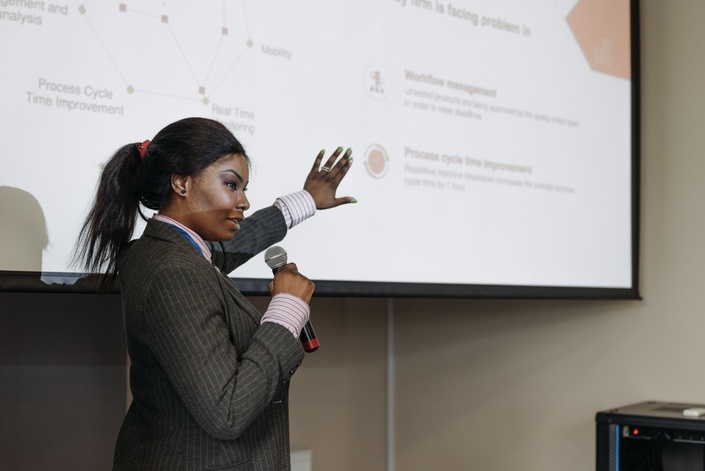Introduce Yourself More Effectively for Presentations
Do you ever feel like your presentation starts off slow or doesn’t grab attention right away?
It’s easy to fall into the trap of beginning a presentation by talking about yourself and your resume, especially as a non-native speaker.
However, this can quickly become boring and ineffective. Instead, you want to engage your audience immediately by framing your job title with relevant experience and keeping the focus on the value you bring.
Rather than listing your work history right at the start, a concise introduction that ties your role to the topic of the presentation helps build credibility while making your content feel more relevant. Save the details for later, when you can weave them into the presentation naturally.
Frame Your Job Title with Relevant Experience
One way to do this is to introduce yourself with a simple statement that highlights how your job contributes to the presentation topic.
Compare the following examples of an introduction to a presentation about launching new products to reflect customer demand and increase sales during an economic recession:
Option 1: My name is Antoine Leblanc, and I am the Senior Sales Analyst.
Option 2: My name is Antoine Leblanc, and, as the Senior Sales Analyst, I have over a decade of experience using data to help companies pivot during difficult times.
The second option adds value not only to the credibility of the presenter, but also to the validity of the content that will be presented.
Add Work Details Later
It's also a good idea to keep your introduction concise and save your work history for later in the presentation, when it can be shared in a more organic and relevant way.
(If someone really wants to know more about your work history, they will look you up on LinkedIn or ask you later.)
Yes, your experience helps people know you're a credible source, but you can sprinkle it in throughout your presentation in a more organic and relevant way. You can use personal experiences to illustrate a points and add value to your presentation.
For example, in a presentation about how to work with local representatives for a project, you could highlight your personal experience while sharing valuable tips:
"Collaborating with politicians can be a bit tricky. I remember when I worked with our city council members on a local education initiative. They were really hard to get in touch with. That's why I recommend getting the contact information for the chief of staff. That's the point person that will help you out the most during the project."
Storytelling is often the most effective way to share information in an interesting and memorable way.
Speak Slowly and Clearly
In addition to framing your job title and adding work details later, it's also important to speak slowly and clearly.
Take your time, and say your name and job title slowly and pause before you move on to the rest of your presentation. This will help your audience understand your value and help you start your presentation calmly and confidently.
Overall, it's important to avoid wasting time talking about yourself at the beginning of a presentation.
Instead, be concise and use this time to frame your job title with relevant experience and add work details later, while also speaking slowly and clearly. This will help you start your presentation confidently and effectively.
Good Communication Makes You More Valuable
Technical skills get you hired, but soft skills get you promoted. Effective communication, in particular, is a soft skill that plays a crucial role in career advancement.
Invest in your future by investing time and effort to improve your communication skills. You got this!
Keep Learning
Loved these tips? Don’t stop now—learn the 3 keys to presenting confidently as a non-native speaker. Click here to dive in!
Also, download your free audio training of the three must-know leadership communication skills for non-native speakers here.
If you’re ready to boost your confidence and deliver presentations that leave a lasting impact, get my mini-course, "Present with Confidence in English," below. You’ll get the tools you need to speak clearly, confidently, and persuasively—no matter the audience.
Start today and transform your presentation skills in just one hour!
